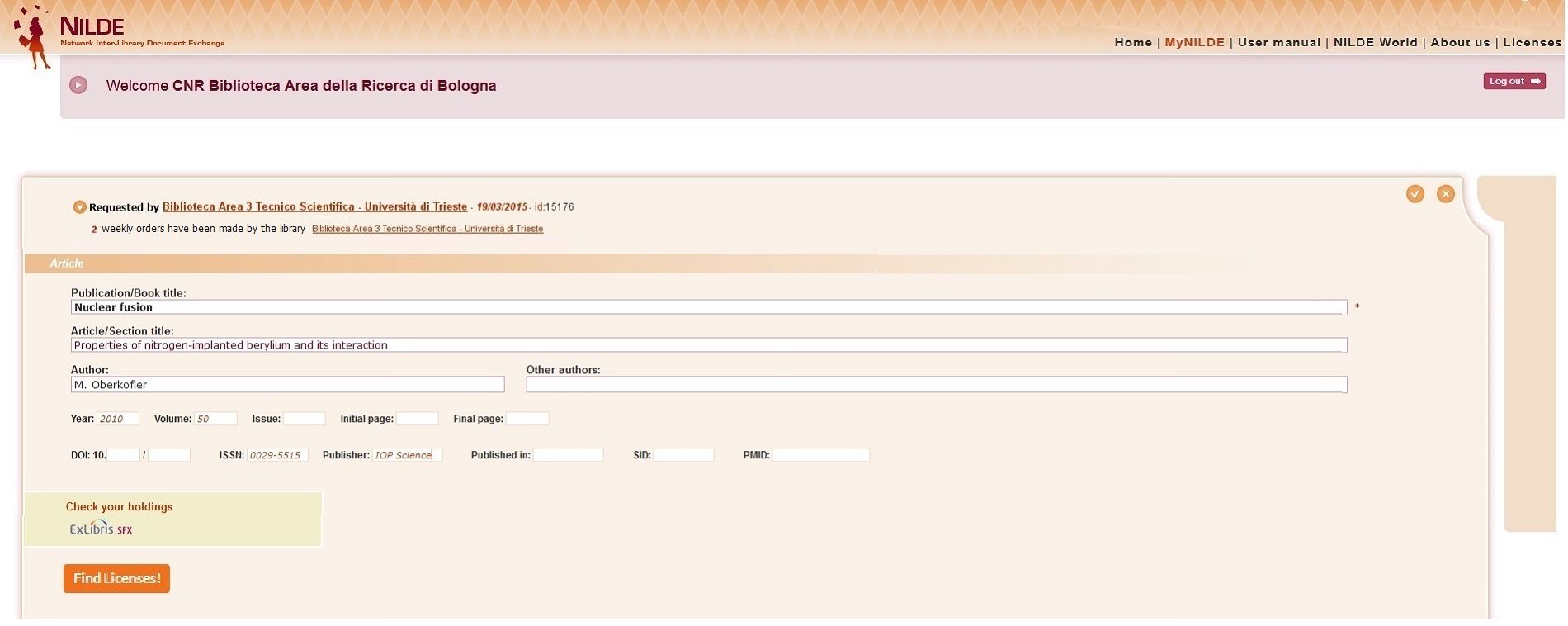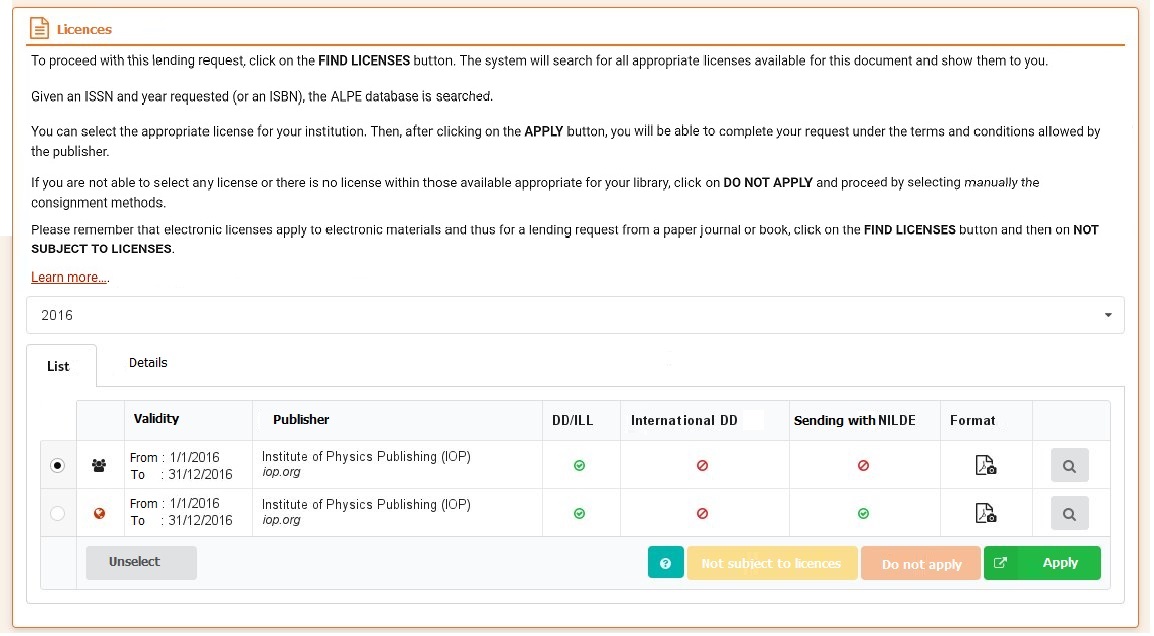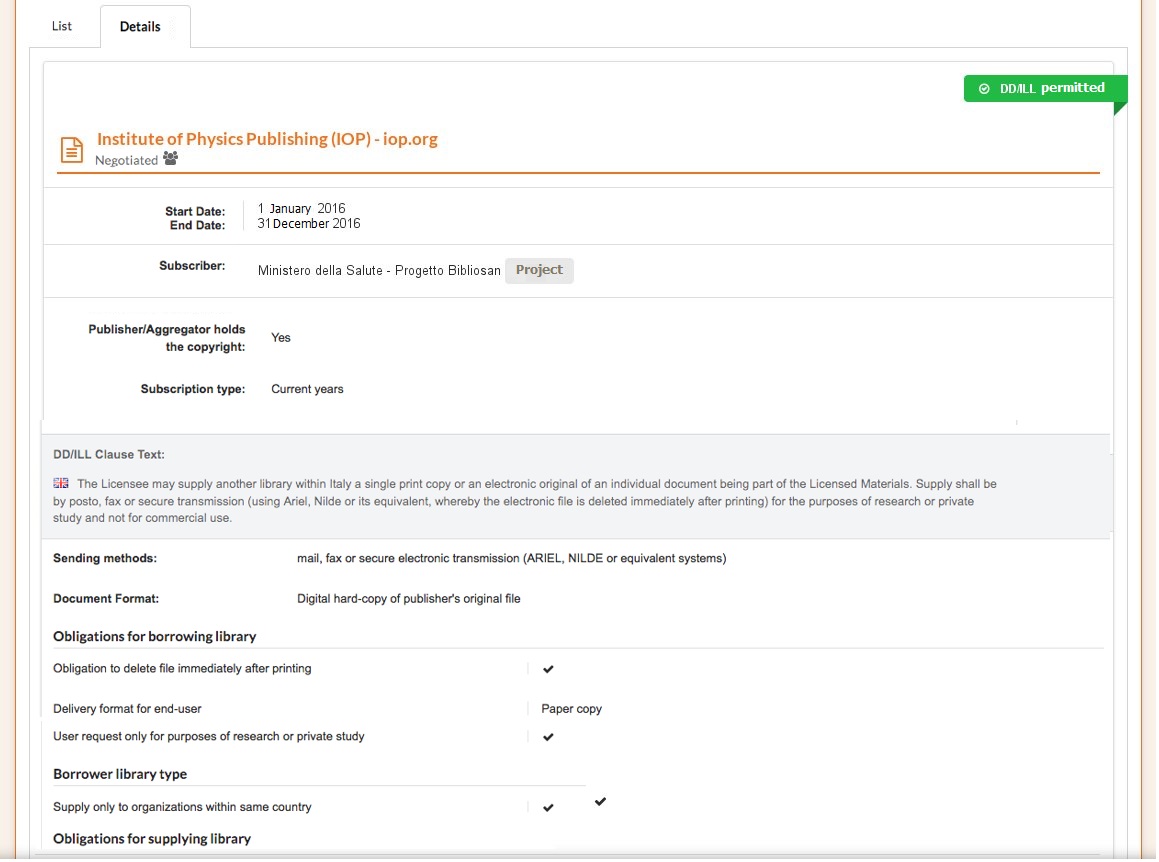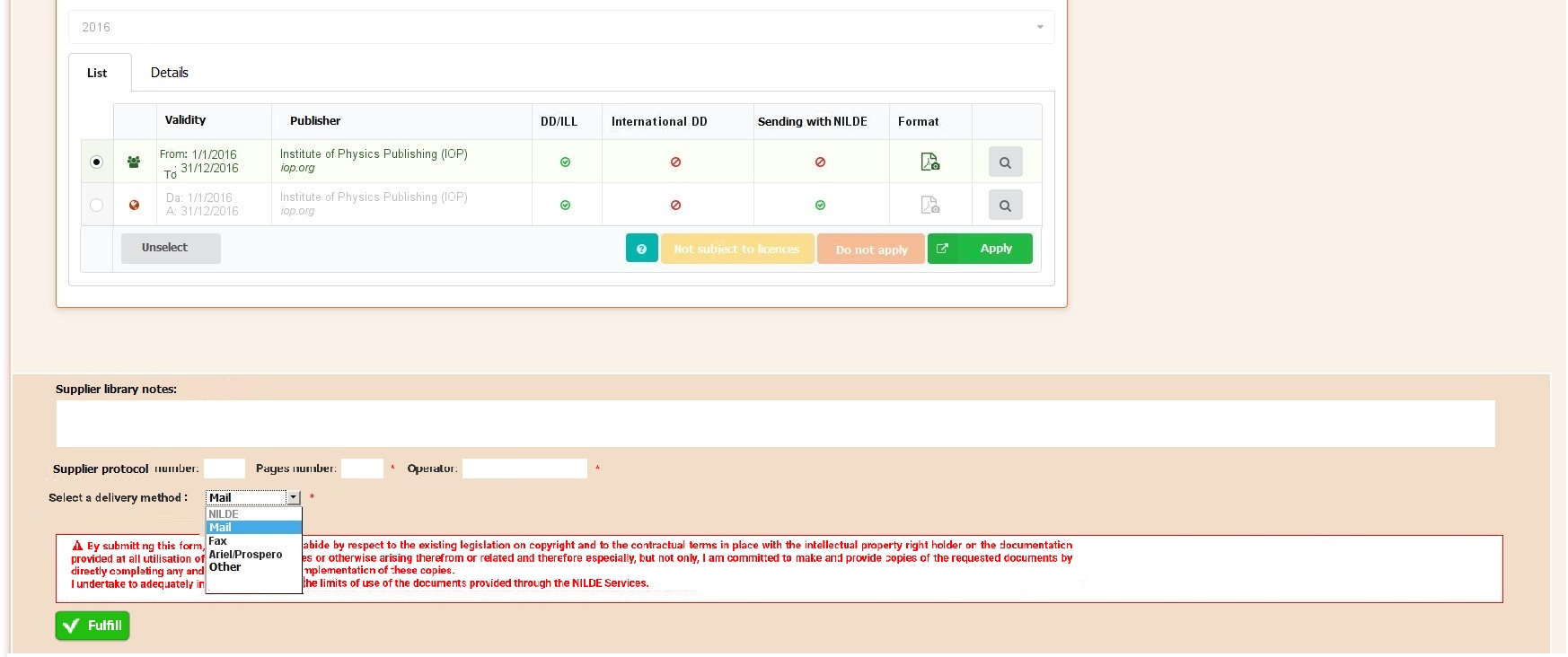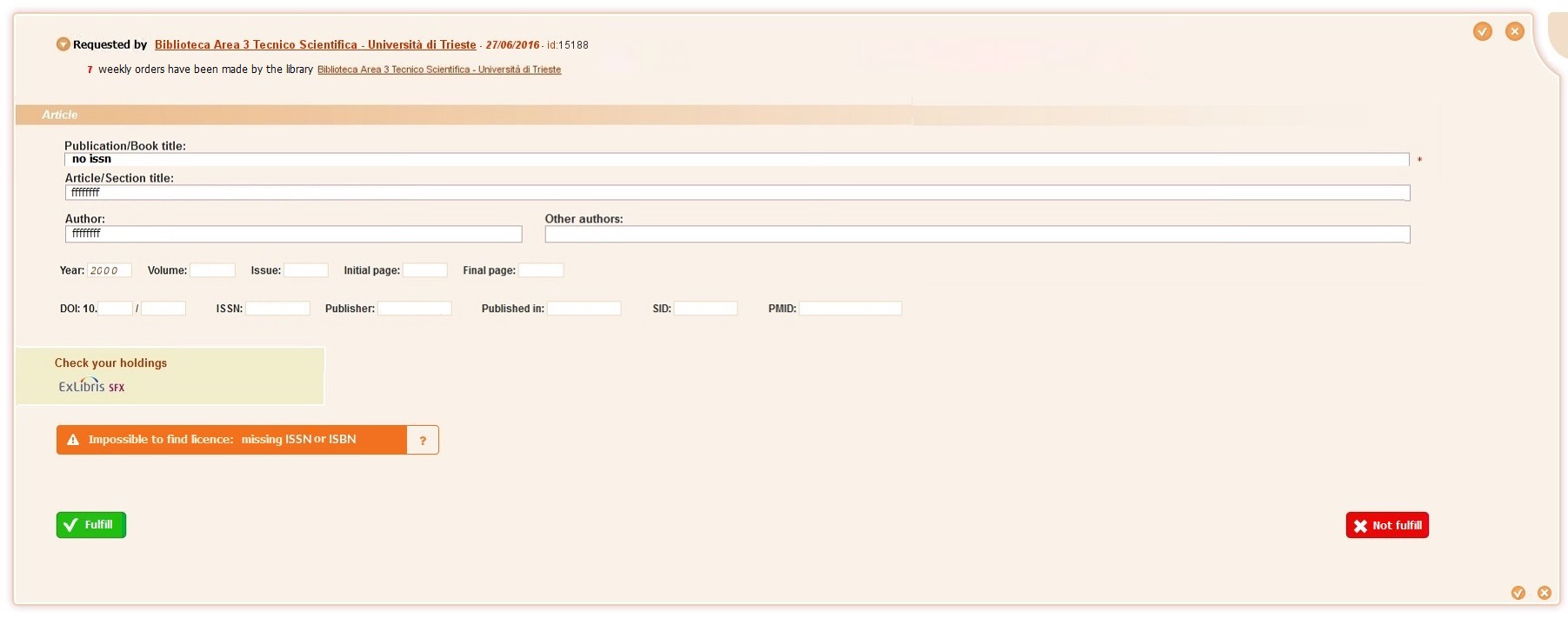You are here
Lending: verify licenses
In the lending phase, the operator must first look for the license agreements relating to the electronic document that he wants to send to the borrowing library. NILDE, thanks to the integration with ALPE, allows you to easily check if the publisher allows the document delivery service for that document and what are the allowed conditions that must be respected when processing the request for lending.
The various cases that can be presented are listed below.
1. Find license
2. Apply license
3. No license found
4. Not subject to license
5. Unable to find a license (missing ISSN)
6. Report a problem or ask for help
1. Find license
In order to proceed with the lending processing it is necessary to click on the button Find licenses. In this way NILDE will proceed to query ALPE (Electronic Periodic Licenses Archive) licences database, using the ISSN and the Year of the user's request as search parameters or the ISBN, in the case of a book chapter.
The Find License button does not work if the ISSN is missing in the user's request or if the ISBN is written in a different form than this: 978-3-16-148410-0 (the dashes must be included). In these cases, to proceed, the operator must correct the data before proceeding with the fulfillment. (go to 5. Unable to identify a license (ISSN missing)).
In NILDE, all the standard licenses and the negotiated licenses valid for the entered search parameters will be displayed in a summary table. The libraries that have integrated NILDE with their SFX will have the advantage that ALPE will only display the licenses related to the resources subscribed by its institution (ie the active targets in SFX).
Moreover, in the case of negotiated licenses, only the licenses, subscribed by the institution to which the library belongs, will be displayed; while in the case of standard licenses, all the reference licenses for the requested electronic document will be displayed.
In this last case, to facilitate the choice, the system allows to associate to the institution the standard licenses related to the electronic resources subscribed.
The table shows the most relevant information for each license, related to:
- type of license
- period of validity of the license
- the publisher name
- DD/ILL (if DD/ILL service is allowed)
- International DD/ILL (if DD/ILL service to foreign libraries is allowed)
- Send by NILDE (if electronic sending is allowed via NILDE)
- Format of the allowed document
Clicking on the magnifying glass, you can view the full record of each license. Moving the mouse on the table data, you can view the explanatory captions of the different icons used.
To unfulfill the request if you do not have the document it does not need to click on the Find licenses button, but you can simply proceed as usual by clicking directly on the Unfulfill button (go to Fulfillment or Unfulfillment of a request).
2. Apply License
From the list of licenses displayed in the summary table, you will need to select your reference license and click on the Apply button.
The software will proceed by automatically applying the conditions stated in the license.
For example:
- if the publisher's license does not allow the DD/ILL service, the system will only display the Unfulfill button and will block the possibility to fulfill further the request. In this case it will then be necessary to continue selecting among the reasons for Unfulfillment the entry "DD not allowed by the license or number of pages exceeding the 15% of the issue /volume"; for further information about how to unfulfill a lending request, go to Fulfill or Unfulfill a request.
- if the license allows the DD / ILL service, but does not allow any type of electronic submission, the system will display the button Fulfill (Fulfill or Unfulfill a request.) and, in the next screen, between the types of delivery it will allow only those allowed by the publisher (in this case mail and fax) and it will inhibit all the other options (which will be displayed in gray and not selectable).
3. No license found
In the case that the system does not return any license, the first operation to do is to check if there is a reference license for the previous years to the one in which you are operating. In fact, the system displays the licenses valid for the current year by default. To check it, simply change the year from the drop-down menu search and select a previous year. If the system finds a license for the previous year, it is possible that the license has not yet been updated for the current year or that an updated standard license is not published on the publisher's site. It is possible to request a license update (send a report following the instructions in point 6. Report a problem or ask for help) and in the meantime continue applying the conditions of the previous year.
If, on the other hand, even if you change the year of validity, no license has been found, it is possible that:
- the publisher standard license has never been included in the ALPE database (send report following the instructions in point 6. Report a problem or ask for help);
- the licence negotiated by your organization / consortium has never been included in the ALPE database (in this case you can ask to join ALPE for the entry of the licenses);
- your institution does not appear among the subscribers of the negotiated license, although entitled to it (send report following the instructions in point 6. Report a problem or ask for help);
- although the license is present in the database, the ISSN is not associated with any license for some of these reasons: wrong license platform URL, inactive SFX Target, inconsistency with Institutional SFX Target. It is possible to check if a license is present (but not displayed) searching directly in the public ALPE database, without being logged in, with the name of the publisher or with ISSN and year of the request.
4. No subject to license
In the case of fulfillment of a request for a print document, it does not need to refer to the conditions of use specified in the licenses (which come into force only referring to electronic resources).
In this case, to proceed to fulfill you need to click on the button Find licenses and then on the button Not subject to license. In the the following phase this will allow to proceed with the fulfillment by selecting the appropriate type of delivery.
See NILDE and copyright.
5. Unable to find a licence (missing ISSN)
NILDE can query ALPE only if the ISSN or ISBN is present in the request. If the data is missing NILDE will display a button with the following message: "Unable to find the license for this request".
In this case it is possible to complete the data of the request by proceeding as follows:
- Enter the ISSN and save the request (by clicking on the button ![]() at the top right);
at the top right);
- Then reopen the request and proceed to fulfill lending by clicking on the Find License button. In this way NILDE will be able to query ALPE.
6. Report a problem or ask for help
1. No license found or incorrect licence
If no license has been found or if the system shows a license that does not correspond to the requested DD item (for example, a mismatched publisher), it is necessary to send a missing or incorrect license message to
, reporting in the e-mail subject line the wording: MISSING LICENSE or ERRATA and reporting all the following data:
- library username (Login NILDE),
- ISSN and year of the request,
- journal publisher,
- link of the downloaded .pdf to send to the borrower library,
- access link to the journal in the "institutional" SFX catalog (only for libraries that have integrated their SFX in NILDE)
- screenshot (just in case of incorrect license and not for missing licenses).
2. Missing license for the current year
If no license has been found for the current year, the license can be updated by sending an alert to , reporting the following data in the email: ISSN and year of request , publisher name, access link to the whole text.
3. Interpretation questions
If instead you believe that there are errors in the reported clauses or difficulties of licence interpretation, please report it to , explaining the reason of the problem in the email text.
Go to the Table of Contents of the Librarian user manual

